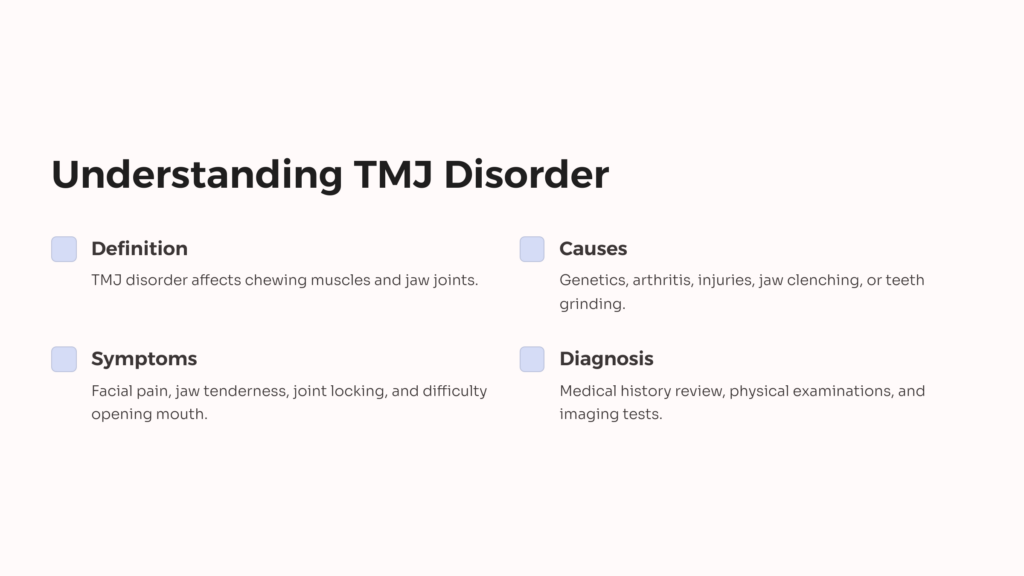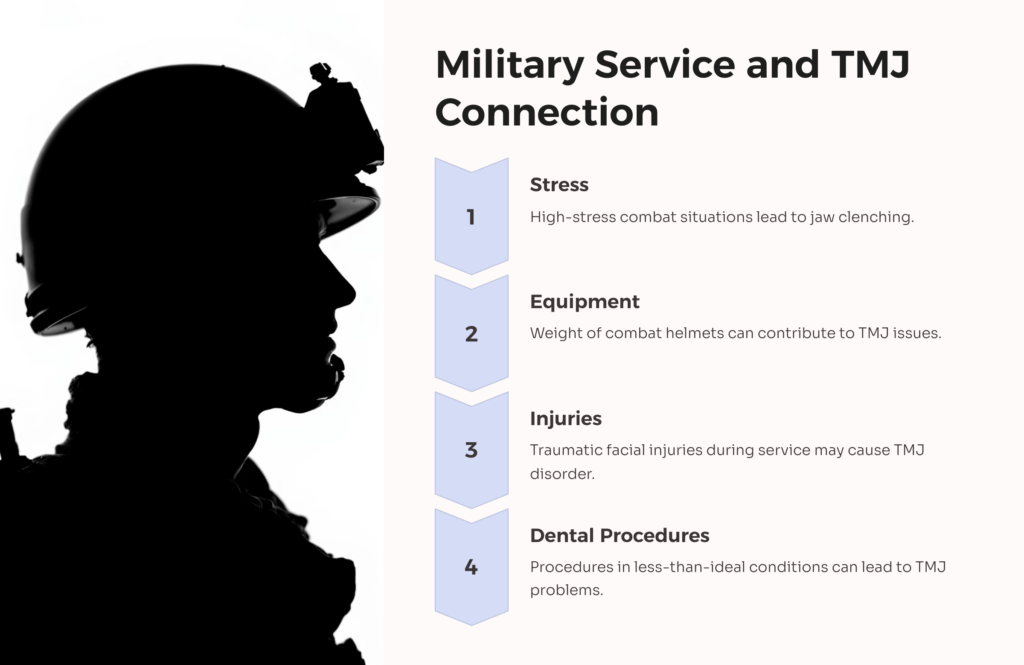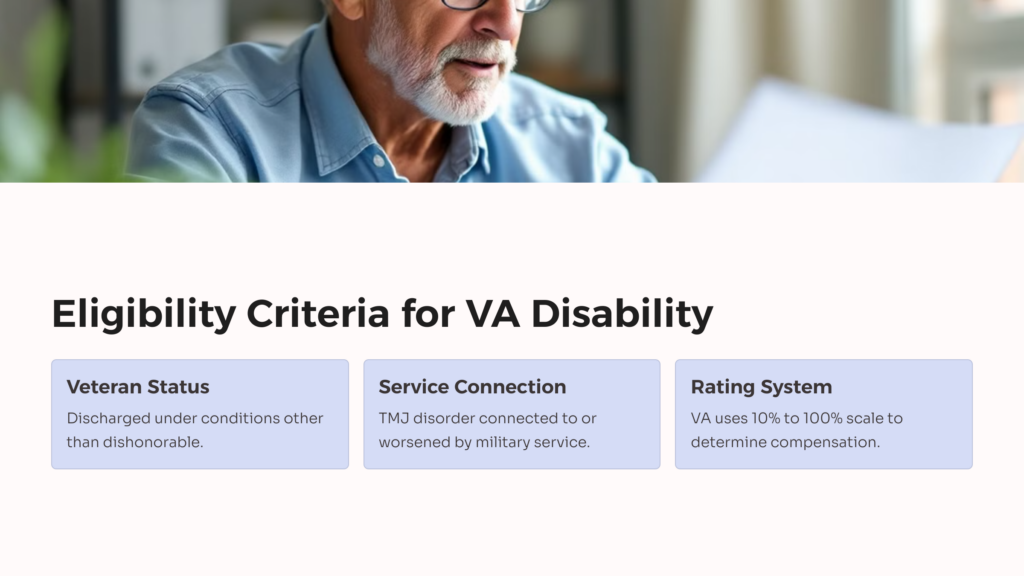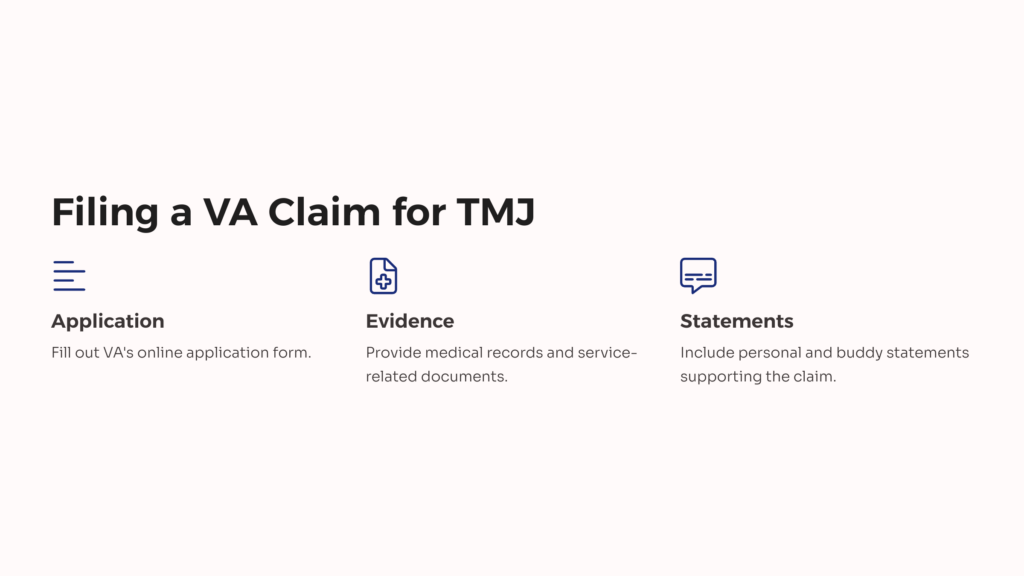Introduction
Temporomandibular joint disorder (TMJ) is a condition that affects the complex joints located on either side of the jaw. These joints help in talking, eating, and even facial expressions. However, when they malfunction because of TMJ disorder, it can lead to a great deal of chronic pain and discomfort. This issue significantly impacts the lives of many individuals, particularly veterans who, due to stressful and strenuous circumstances in military service, are more exposed to developing this disorder.
Understanding TMJ Disorder

Comprehensive Explanation of TMJ Disorder
TMJ disorder is a type of temporomandibular disorder (TMD) that primarily affects the chewing muscles and the temporomandibular joint that connects your lower jaw (mandible) to your skull. The causes can range from genetics, arthritis, injuries to the jaw area, frequent clenching of the jaw, or the grinding of teeth.
TMJ symptoms are fairly distinctive. Those with TMJ disorder often suffer from discomfort or pain in the face, tenderness around the jaw, inconvenient locking of the joint, difficulties in mouth opening, and even a subtly shifting chronic pain that could extend to the neck or shoulders, among others.
To diagnose temporomandibular joint disorder, doctors typically review a patient’s medical history, conduct physical examinations focusing on the mandible, jaw, and face, and may also order imaging tests like X-rays, CT scans or MRI.
Common treatments range from pain relievers, muscle relaxants, oral splints or mouth guards, to physical therapy. In severe cases, surgical procedures or other medical interventions may be necessary to help jaw movement.
The Relationship Between Military Service and TMJ Disorder

There’s an undeniable link between military service and TMJ Disorder. High-stress combat situations during active duty that lead clenching jaw movement, the weight of combat helmets, or traumatic facial injuries could lead to TMJ disorders. Dental procedures conducted under less than ideal circumstances could also contribute to this issue.
VA Disability for TMJ
Legal Background of VA Disability for TMJ
TMJ is officially recognized as a disability by the Department of Veterans Affairs (VA). This recognition did not come easily; it took years of lobbying by veterans and the medical community, who highlighted the significant impact of the condition on a veteran’s quality of life for the condition to qualify for a VA disability claim and VA compensation benefits.
Criteria Used to Determine Eligibility

There’s a set of standard conditions to be met for an individual to be eligible for TMJ VA disability benefits. The individual must be a veteran that was discharged under conditions other than dishonorable, and TMJ disorder should be either connected to their military service or significantly worsened by it in order to receive disability compensation. Specifically, the disabled veteran needs to show a service connection to active duty military service. Alternatively, if the veteran had TMJ issues before entering the military, they need medical evidence indicating their condition was made markedly worse as a result of the rigors of military service—for example, if their jaw pain and dysfunction substantially increased after experiencing trauma or hardship while deployed.
The VA applies a Disability Rating Schedule for TMJ disorder, which uses a range of 10% to 100% to quantify the severity of the disorder and corresponding compensation amount. Higher ratings indicate more severe TMJ symptoms and greater impact on occupational or daily functioning. The ratings translate to monthly payment amounts designed to compensate the disabled veteran for their impairment.
Process of Filing a VA Claim for TMJ

Filing a VA disability claim involves filling out an application form which can be found on the VA’s website. A comprehensive guide written with simple language is provided to assist in application. Documents required include:
- All medical evidence related to the TMJ disorder like medical records, physician statements, and any other relevant material like witness statements
- Records that demonstrate the link between military service and the TMJ disorder such as service treatment records showing injury or onset of symptoms while in service
- Personal statements from the veteran detailing how they believe their military service caused or aggravated their TMJ disorder
- Buddy statements from people who served with the veteran corroborating events related to the TMJ injury or symptoms
Legal considerations revolve around affirming that the condition developed due to or worsened by military service. The evidence should clearly establish that connection or nexus between military service and current TMJ disorder.
Resources for Veterans with TMJ
Several resources exist to aid veterans suffering from a temporomandibular disorder. Online platforms, forums and support groups are available, some specifically catered to veterans. These provide a space for sharing experiences, coping mechanisms, and overall moral support. The veterans’ hospitals and community-based outpatient clinics offer specialized medical treatments. There are also non-profit organizations and veterans advocacy groups dedicated to providing assistance to veterans, offering everything from medical guidance to help in claim applications.
Conclusion
Life with TMJ disorder is unquestionably difficult, more so when you’re a veteran carrying the additional weight of your service-related experiences. But, armed with the knowledge of understanding the disorder, the legal background of the VA benefits, the filing process for veterans claims, and the available resources, the path to managing the condition becomes clearer. Finally, the strength and courage observed in your military service is the same strength that will guide you through this journey.
 AllVeteran.com Advisors
AllVeteran.com Advisors
With expertise spanning local, state, and federal benefit programs, our team is dedicated to guiding individuals towards the perfect program tailored to their unique circumstances.











